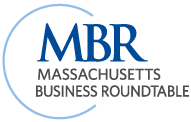What We Learned on Our Trip to D.C.
Last month, Tonja and I attended the Annual Meeting of State Business Roundtable
Executives in Washington, D.C., hosted by the national Business Roundtable. This
annual convening provides an opportunity to share experiences, priorities, and
compare notes with peers from around the country. It is a productive forum to discuss
both organizational and policy issues and is always a fascinating peek into the psyche
of other parts of the country.
This year’s agenda included updates from Business Roundtable staff on issues such as
immigration, workforce, and artificial intelligence; a meeting with White House
officials from the Office of Public Engagement, including its Director, Stephen
Benjamin, Senior Advisor to the President; a presentation on public opinion polling
from Bill Knapp, a veteran pollster and political strategist; and a roundtable
discussion with colleagues from Arizona, Colorado, Hawaii, Illinois, Iowa, Maryland,
Michigan, Minnesota, New York, Ohio, Oklahoma, Oregon, Vermont, Washington, and
West Virginia.
Here are five key takeaways:
- Massachusetts, the Blue Bubble in a Divided Country: As is the case every
time we attend these meetings, it is clear that Massachusetts is, politically, a
very blue bubble in a very divided country. The presentation from Bill Knapp
showed that the United States is the third most polarized country in the world,
which becomes evident during trips like this. One survey showed that 55% of
voters across the country approve of the job President Trump did as President,
and he has a 4% national favorability gap versus President Biden’s gap at -7%.
That is simply not the reality in Massachusetts. At the same time, the issues we
are all facing are generally the same: housing, workforce, and infrastructure.
- Clean Energy Transition: The transition to clean energy and its impact on
economic development emerged as a key priority among colleagues from
around the country. While there was overwhelming support for clean energy,
serious concerns were raised about the negative impacts on growth, state
economies, and economic development during the transition period. This was
the top issue raised with the White House, with numerous states expressing
concerns about federal clean energy policy and the pursuit of emissions goals
conflicting with state economic development strategy.
- Growing Incorporation of AI: State Roundtables from around the country are
beginning to incorporate AI into their operations, including: email drafting;
meeting summaries; notetaking; accounting; and drafting of op-eds and
testimony. The Roundtable has not utilized it to any significant degree, but
based on the conversation in D.C., we are exploring potential ways for AI to
enhance our work.
- The Presidential Elections: Voter Turnout and Tax Policy: During the
presentation on the upcoming presidential election, three questions were
raised as ones to watch that could potentially determine the outcome: (1) Will
young voters turn out; (2) Will the Hispanic vote continue to migrate to the
Republican party; and (3) Will suburbs come out enough for President Biden?
There is also an expectation that tax policy will be front and center, which could
drive an anti-corporate narrative.
- Outmigration Needs to be Addressed: Finally, I was struck by a conversation
I had at dinner with a colleague who runs a Roundtable in another state. He
relayed a story about a CEO member of his who moved to Massachusetts a
couple of years ago for cancer treatments. He is now cancer-free, his son
attends Harvard, and he would like to stay in Massachusetts. However, because
of the income surtax, he intends to leave. We often talk about retaining talent
that attends the state’s colleges and universities, but people come here for
other reasons, and given our talent challenge, we need to be advocating for
public policies that will encourage everyone to stay. We will continue to do that
at the Roundtable.
This network of state roundtables, which MBR convenes, as well as the relationship
with the national Business Roundtable, provide a valuable resource to us and we are
grateful for the collaboration and support.
RECENT POSTS
- No Borders: Climate Change, A Call to Action for All
- Celebrating Diversity
- A Talent Agenda to Drive Massachusetts Competitiveness
- Taking Aim at the State’s Competitiveness
- Bentley and Roundtable Gather Executives To Discuss How Business Impacts Society
- Quarterly Policy Roundup: Q2 2024
- What We Learned on Our Trip to D.C.
- Conversations with Business Leaders: Navigating the Challenges Impacting Growth in Massachusetts
- Quarterly Policy Roundup: Q1 2024
- Black History Month: Reflections from Roundtable Staff
